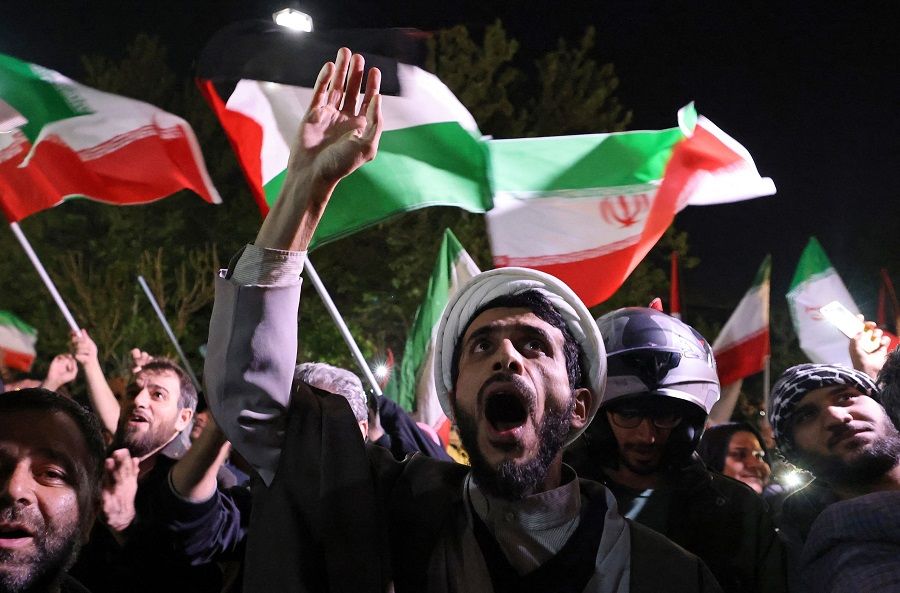How to understand Iran's attack on Israel?
Although its consulate was attacked, military retaliation was not Iran's first choice against its enemy, opines Chinese academic Fan Hongda. In the absence of a peaceful resolution to the dispute, it has no choice but to retaliate militarily against Israel. In this way, Iran launched an attack on Israel on 14 April.

On 14 April, two weeks after its consulate in Damascus was bombed by Israel, Iran finally launched military retaliation against Israel. The Islamic Revolution Guards Corps (IRGC) launched about 300 missiles and drones towards Israel. Iran's key target was an Israeli military base where the attack against Iran's embassy building in Damascus originated.
Israel had launched an attack on the Syrian capital on 1 April, hitting the consular section of Iran's embassy there and killing a total of 13 Iranians and Syrians, including Mohammad Reza Zahedi, a senior commander of the IRGC.
Whose attack is reasonable?
The attack on diplomatic establishments is a clear violation of the United Nations Charter, the 1961 Vienna Convention on Diplomatic Relations and the 1963 Vienna Convention on Consular Relations. With its consulate attacked, the Islamic Republic of Iran quickly decided to retaliate against Israel.
If Israel considers Iran's retaliation after the attack on its consulate unreasonable, it would not be able to justify its ongoing violent response to the Hamas attack on 7 October, which is also the result of the long-standing Palestinian-Israeli conflict.
According to Israel's explanation, the attack was launched in response to Iran's long-standing anti-Israeli operations in Syria. It was the result of a long-term conflict between the two sides and Iran should not directly attack Israel just because its consulate was attacked.

If Israel considers Iran's retaliation after the attack on its consulate unreasonable, it would not be able to justify its ongoing violent response to the Hamas attack on 7 October, which is also the result of the long-standing Palestinian-Israeli conflict. But obviously, Israel has not stopped highlighting the 7 October attack.
Whose support poses a greater threat?
The Biden administration has also been emphasising the need to guard against Iran's attacks on Israel, saying that Iran's funding and support for anti-Israel forces such as Hezbollah, Hamas and the Houthis is a major threat to Middle East security. But, in terms of the number of weapons and financial support provided to parties in conflicts in the Middle East, the US's supply to Israel far exceeds Iran's external support.
For example, in 2016, the Barack Obama administration signed a ten-year agreement to provide Israel with US$3.8 billion per year, mostly in foreign military financing grants, allowing Israel to purchase US weapons. Even as the international community strongly calls for an end to the ongoing Gaza-Israel war, the US continues to supply Israel with arms. Washington's actions are the greater threat to Middle East security.

It is worth noting that although its consulate was attacked, military retaliation was not Iran's first choice against Israel. Tehran has been concerned that if there is a war with Israel, Iran's national security situation will become even more severe. Moreover, the US will stand on the opposite side with the enemy in such a war. I tend to believe that Iran once preferred to resolve its disputes with Israel through peaceful means.
Early in the morning of 11 April, Iran's mission to the United Nations stated on social media that if the Security Council had previously condemned Israel's attack on the Iranian consulate, Iran could have considered not taking retaliatory actions against Israel. The implication is that because the US, the UK and France blocked the Security Council's statement condemning the Israeli attack, Iran has to consider retaliatory actions against Israel.
Because of its small territory and lack of strategic depth, Israel cannot withstand the war damage that Iran can withstand once a war breaks out.
In case of war
As a regional power, Iran needs to safeguard its dignity and strategic position in the region. In the absence of a peaceful resolution to the dispute, it has no choice but to retaliate militarily against Israel. In this way, Iran launched a military attack on Israel on 14 April.
Even so, Tehran informed the US on the day of the attack that Iran's retaliation would be limited and low intensity. Tehran said it would end the attack soon if Israel did not react violently. Therefore, following Iran's attack, the response of the party responsible for triggering and escalating the conflict would become the core factor affecting the development of the situation.
If Israel strikes back violently, the Iran-Israel military conflict will definitely escalate. Because of its small territory and lack of strategic depth, Israel cannot withstand the war damage that Iran can withstand once a war breaks out. What's more, Israel also needs to guard against Iranian-backed forces in its surroundings, such as Hezbollah and the Houthi armed forces.
Therefore, unless Israel can immediately destroy the missile and drone strike capabilities of Iran and its supporters, an escalating war with Iran will put Israel in danger. At this point, the US will have to get involved to help Israel, and the war will therefore extend beyond the Middle East.

In fact, all parties are well aware of this. Therefore, Iran has told the US not to get involved in the Iran-Israel conflict. Washington has also continued to exert pressure on Israel to ease the situation. Before Iran attacked Israel, the US had communicated with many countries, hoping that they would persuade Iran to act with caution and called on Iran to exercise restraint.
But it is quite clear who is primarily responsible for the deterioration of the situation in the Middle East caused by Israel's attack on the Iranian consulate.
Whose responsibility?
On the evening of 11 April, member of the Political Bureau of the Chinese Communist Party Central Committee and Minister of Foreign Affairs Wang Yi spoke with US Secretary of State Antony Blinken on the phone at US request. Wang said that China strongly condemns the attack on the Iranian embassy in Syria. He stressed that this round of escalation is the latest spillover of the Gaza conflict, and the pressing need now is to bring an end to the conflict as soon as possible.
Wang said that China will definitely play a constructive role in resolving the Middle East issue and contribute to cooling down the situation. But the US in particular must play a constructive role. The Chinese Ministry of Foreign Affairs emphasised this point again after Iran launched an attack on Israel.
I believe China has always been willing to do what it can to ease tensions in the Middle East. But it is quite clear who is primarily responsible for the deterioration of the situation in the Middle East caused by Israel's attack on the Iranian consulate. Israel should indeed actively de-escalate the current very tense Iran-Israel confrontation.
Judging from history, the confrontation between Israel and Iran will continue.

In a phone call with the Israeli prime minister on 14 April, President Joe Biden made it clear that the US would not support or participate in a possible Israeli attack on Iran. Israeli Prime Minister Benjamin Netanyahu reportedly cancelled a plan to launch immediate retaliatory strikes against Iran after speaking to Biden.
Of course, this is a good sign. But it is not enough, because all Israel cancelled was a plan for immediate retaliation. Judging from history, the confrontation between Israel and Iran will continue. Although the possibility of a frontal military attack on Iran is declining, Israel is still likely to create trouble for Iran, and it does have this capability.
The concern regarding the Iran-Israel confrontation and its threat to regional stability remains unabated. Peace in the Middle East cannot be achieved without the promotion of world powers. As the most influential world powers today, China and the US should cooperate more in this regard.





